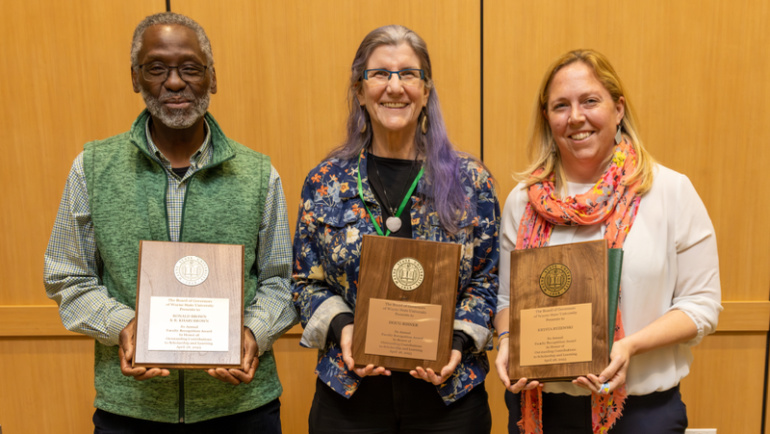
Seven Wayne State professors were honored with 2023 Board of Governors Faculty Recognition Awards at April’s Board of Governors (BOG) meeting.
The awards are given annually to full-time faculty members who make outstanding contributions to scholarship and learning. Each recipient receives a citation from the board, an engraved wall plaque and a monetary award.
The awardees are selected by a committee of previous BOG Faculty Recognition Award winners.
This year’s recipients are:
- Krysta Ryzewski, associate professor of anthropology in the College of Liberal Arts and Sciences
- Doug Risner, professor of dance in the College of Fine, Performing and Communication Arts
- Hilary Marusak, assistant professor in the Department of Psychiatry and Behavioral Neurosciences in the School of Medicine
- Daniel Ellman, assistant professor (clinical) of law, and Rebecca Robichaud, assistant professor (clinical) of law in the Law School
- Ronald Brown, associate professor of political science, and R. Khari Brown, professor of sociology in the College of Liberal Arts and Sciences
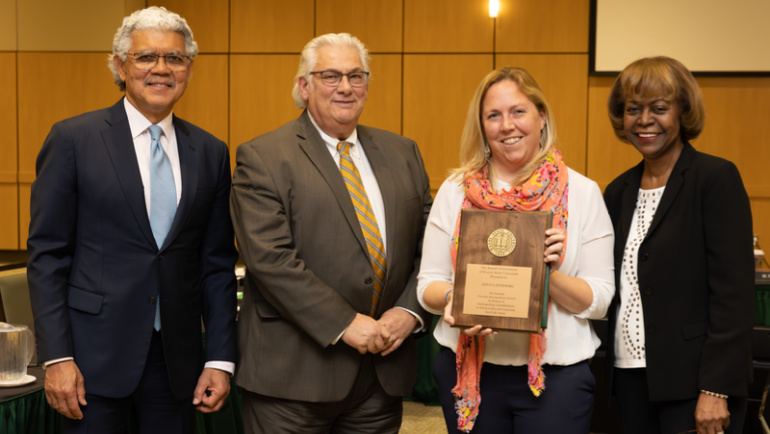
Krysta Ryzewski was recognized for the publication of Detroit Remains: Archaeology and Community Histories of Six Legendary Places (University of Alabama Press, 2022).
A trailblazing voice in the fields of contemporary and historical archaeology, Ryzewski combines a multidisciplinary approach with contemporary storytelling and community engagement to bring deep place-based and under-represented accounts back into the narrative of Detroit’s history. Detroit Remains examines complex issues at the intersection of race, class and gender relations through six case studies of historic sites that date from the mid-19th to the mid-20th century.
Through Ryzewski’s deft hand as archaeologist and writer, and based on sustained community consultation, the book restores hidden stories that forefront African American and immigrant histories.
“I am honored to receive the Board of Governors award for Detroit Remains: Archaeology and Community History of Six Legendary Places,” Ryzewski said. “This is the first book published about the historical archaeology of Detroit — and one of the few archaeological studies nationwide to focus on the Great Migration period. The archaeological investigations highlighted in Detroit Remains are the outcome of a decade’s worth of collaborative projects between Wayne State faculty, students, alumni and several community partners. Their contributions to Detroit’s historic preservation and advocacy efforts are also to be commended with this award.”

Doug Risner was recognized for the publication of Masculinity, Intersectionality and Identity: Why Boys (Don't) Dance (Palgrave Macmillan, 2022).
Risner’s Masculinity, Intersectionality and Identity: Why Boys (Don't) Dance, coedited with Beccy Watson, comprises significant works from 21 international scholars that illustrate the myriad experiences of and challenges faced by male dancers and how dance might shape a man or boy’s sense of self. This volume, to which Risner is also a contributor, uniquely brings together artistic practice, dance pedagogy, and theory with a forward-thinking approach that challenges and disrupts persistent gendered norms of the dance world, dance scholarship and beyond.
Masculinity, Intersectionality and Identity: Why Boys (Don't) Dance is a groundbreaking volume that will contribute to advancing equity and inclusivity in dance education, research and practice. Risner’s commitment to intellectual artistry and a lifetime of advocating for representation of boys and men in dance, as well as his unwavering commitment to mentoring and teaching a new generation of dance educators and scholars, is inspired and exemplary.
“There’s so much I could say about this book, and receiving the 2023 BOG Faculty Recognition Award — what an honor,” Risner said. “I don’t know where to start, but here goes: Although I have authored and edited many books over the past 15 years at Wayne State University, Masculinity, Intersectionality and Identity: Why Boys (Don’t) Dance epitomizes my deep and unwavering commitment to bring together and lift up emerging scholars alongside esteemed authors in one collected volume.
“I so appreciate the Board of Governors’ respect for and recognition of edited volumes of this stature. My most sincere thanks to the 21 contributors to this volume and my second editor, Dr. Beccy Watson, for her astute support and contributions to this book. To receive the Board of Governors Award at this stage of my long career in postsecondary education gives me great support for continuing this research. I am humbled by this prestigious award.”

Hilary Marusak was recognized for establishing and advancing the Science Policy Network-Detroit.
Science Policy Network-Detroit (Sci-Pol Detroit) was founded in 2020 by students in Marusak’s laboratory, and under her guidance, it has grown in number and influence. This student organization aims to improve science advocacy and communication between scientists, lawmakers, and the public.
In June 2022, Marusak led a group of students and scientists from Sci-Pol Detroit to Washington, D.C., to meet with five members of the Michigan congressional delegation. The students discussed critical issues and legislation related to federal science funding, maternal and perinatal health, and health disparities. In her continued work as an advisor for Sci-Pol Detroit, Marusak has established a sustainable framework for students and faculty to advocate for science and have a lasting impact on the Wayne State University community.
“I am delighted to receive this award on behalf of Science Policy Network-Detroit, the student-led science policy group I cofounded and advise on,” Marusak said. “This award was in recognition of our inaugural trip to Capitol Hill in Washington, D.C., last summer, where our students led discussions with lawmakers about the importance of federal science funding and advocated for science-based policies.
“This trip was a tremendous success, and we plan on going again this upcoming June. So, it’s a great time to become involved if you are a student, scientist, faculty or staff member. This trip also paved the way for advocacy on the state level; SciPol-Detroit visited the Michigan State Capitol last month. This award is a reflection of the dedication and passion of Wayne State students in serving as engaged citizen scientists, advocating for science funding and education, preparing the next generation of scientists, and improving the lives of Detroiters and those around the country with science-based policies. I am so incredibly proud of this group and humbled by them every single day.”
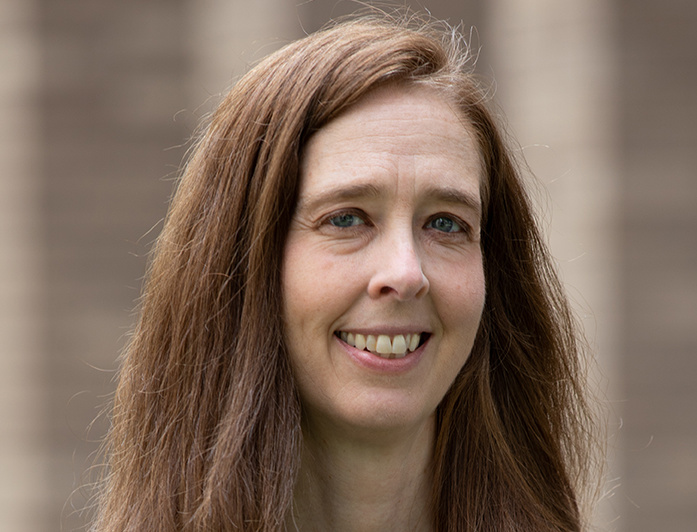
Daniel Ellman and Rebecca Robichaud were recognized for their work creating the Holistic Defense Partnership at Wayne State University.
The Holistic Defense Partnership is a collaboration between the Law School and the School of Social Work, along with several other organizations, to provide legal and social services to criminal defendants.
To meet defendants' complex human needs, including mental illness, substance abuse, eviction, homelessness and immigration-related difficulties, the program offers a client-centered and community-oriented approach to legal representation. Law students work alongside social work students, together with supervising attorneys and others, to provide creative and comprehensive representation that meets clients' individual needs and offers them the services they require, including counseling and advocacy.
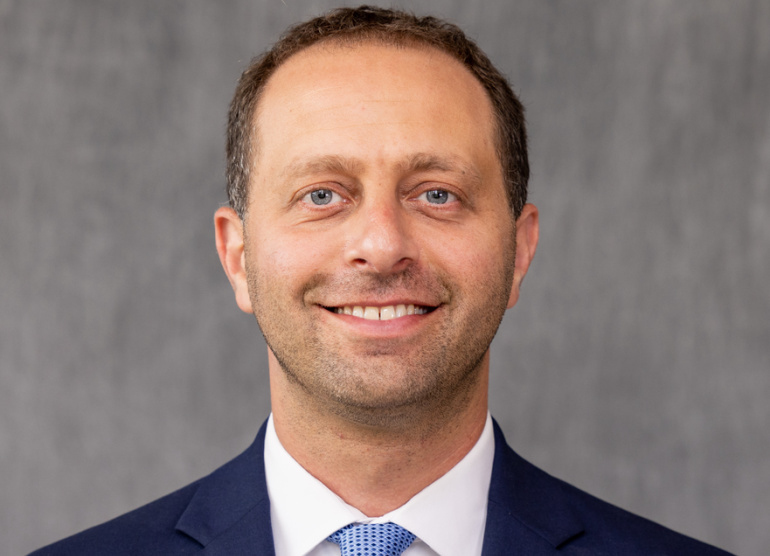
Ellman and Robichaud leveraged their professional backgrounds and community connections to develop the partnership on top of their regular duties and have already achieved significant success for their students and the wider community.
“I am incredibly honored to receive the Board of Governors Faculty Recognition Award,” Ellman said. “For me, receipt of this award acknowledges the value of the holistic defense program to our students, the university, and the community at large. The program, a partnership between the Law School and School of Social Work, highlights the ways in which interdisciplinary collaboration can provide comprehensive and supportive services that prioritize the individuals served. I am very grateful to my colleagues and the program’s legal service providers, whose teamwork has enabled this initiative to be such a success.”
“Receiving the Board of Governor’s Faulty Recognition Award for our efforts on the Holistic Defense program is a wonderful tribute to the work of so many people,” Robichaud said. “Being recognized for this collaboration and the opportunities created for our students to serve the greater Detroit community is such an honor. Partnering with the School of Social Work on this project models the work we hope our students engage in through this program and into their legal careers. We appreciate the recognition by the Board of Governors of the importance of this work. We see it as another component of the Law School’s commitment to access to justice issues.”
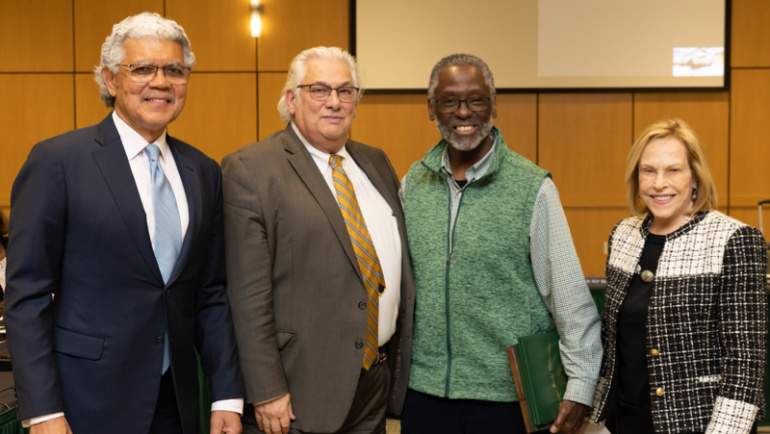
R. Khari Brown and Ronald Brown were recognized for the publication of Race and the Power of Sermons on American Politics (University of Michigan Press, 2021).
Race and the Power of Sermons on American Politics draws on a wide range of sources including public opinion surveys and original sermon texts to help readers understand the interplay between organized religion and race, and how they together shape contemporary America.
By interweaving responses from dozens of disparate surveys conducted over decades but never before considered together, the book tells a new story of how Americans engage with the messages of their religious leaders and how those leaders take (or avoid taking) public stands on issues of race and social justice that may then lead to political action.
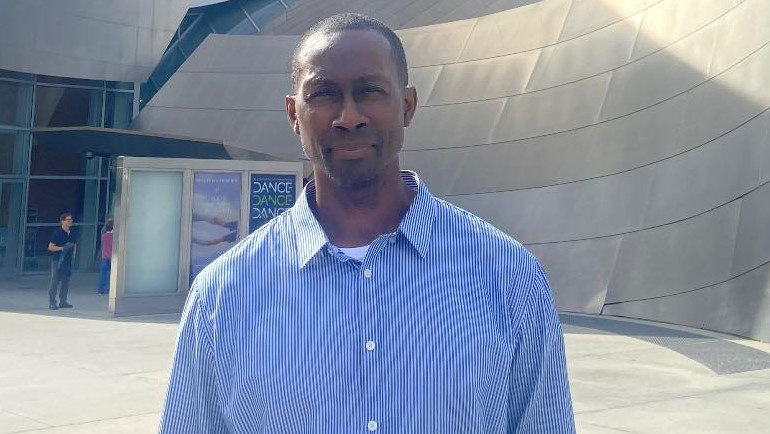
In an era of renewed concern about obvious racial injustice and widening polarization around response to that injustice, this book offers a nuanced and grounded account of how religious institutions can play a role in empowering citizens and improving their understanding of the interplay between religion and politics.
“We strongly believe religious leaders have a moral and spiritual obligation to persuade those in the pews to engage in social and political actions seeking to eradicate racial divisions,” Ronald Brown said. “Talking about social justice motivates congregants to engage in politics. While racial and political polarization curtails clerical dialogue about wedge issues such as affirmative action, immigration reform and police reform, our exploration of survey data between 1941 and 2019 suggests that clergy have a great deal of influence. Our research findings are laying the groundwork for more in-depth dialogue with local and national clergy about our civil religious tradition and the joint responsibilities of clergy and religious scholars.
“Finally, we are developing a teaching and learning module allowing students to work with Detroit-based religious-based social movement organizations,” Brown added.
